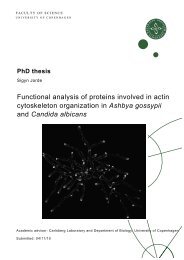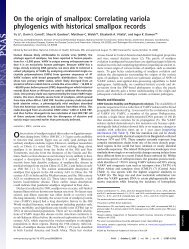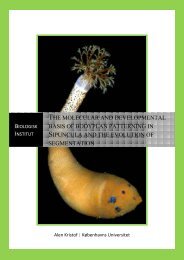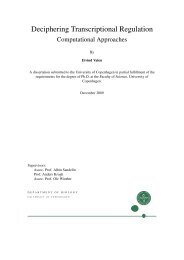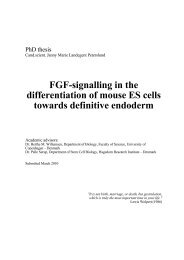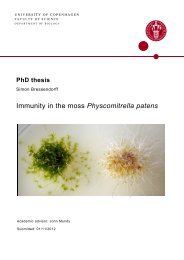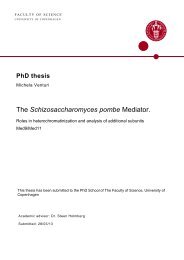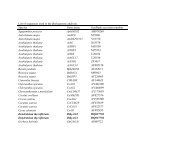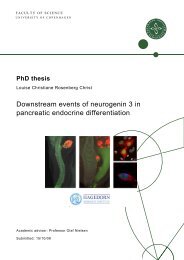The obesogenic effects of polyunsaturated fatty acids are dependent ...
The obesogenic effects of polyunsaturated fatty acids are dependent ...
The obesogenic effects of polyunsaturated fatty acids are dependent ...
Create successful ePaper yourself
Turn your PDF publications into a flip-book with our unique Google optimized e-Paper software.
20<br />
21<br />
22<br />
23<br />
24<br />
25<br />
26<br />
27<br />
28<br />
29<br />
30<br />
31<br />
32<br />
33<br />
34<br />
35<br />
36<br />
37<br />
38<br />
39<br />
40<br />
41<br />
42<br />
43<br />
Introduction<br />
A considerable number <strong>of</strong> studies has demonstrated the beneficial <strong>effects</strong> <strong>of</strong> n-3 <strong>polyunsaturated</strong><br />
<strong>fatty</strong> <strong>acids</strong> (PUFAs) on lipid metabolism and lipid-related disorders in humans (1-3) and increasing<br />
the relative amount <strong>of</strong> n-3 PUFAs is presently recommended. Moreover, diets enriched with n-3<br />
PUFAs have been demonstrated to reduce the development <strong>of</strong> insulin resistance (4-9) and to reduce<br />
the development <strong>of</strong> diet-induced obesity in rodents (7, 10-15). We have shown that the<br />
macronutrient composition <strong>of</strong> the diet determines the adipogenic potential <strong>of</strong> dietary corn oil in<br />
mice (16). Moreover, we recently demonstrated that sucrose counteracts the anti-inflammatory<br />
effect <strong>of</strong> fish oil in adipose tissue and increases obesity development in mice (17). Mice fed a fish<br />
oil enriched diet in combination with sucrose had markedly higher feed efficiency and required less<br />
than 50% <strong>of</strong> the calories to achieve the same weight gain as mice pair-fed a fish oil enriched diet in<br />
combination with protein (17).<br />
A major difference between proteins and sucrose is the ability to cause a rise in blood<br />
glucose and stimulate insulin secretion. Insulin is a powerful anabolic hormone that stimulates<br />
adipocyte differentiation and adipose tissue expansion (18), and activation <strong>of</strong> insulin signaling is<br />
crucial for the development <strong>of</strong> obesity (19). Moreover, increased insulin signaling by transgenic<br />
expression <strong>of</strong> insulin receptor substrate-1 (IRS-1) is sufficient to induce obesity (20). Thus, it is<br />
possible that increased insulin signaling and glucose uptake in adipose tissue in the fed state in<br />
sucrose fed mice may override the anti-inflammatory and anti-obesity <strong>effects</strong> <strong>of</strong> fish oil.<br />
<strong>The</strong> glucose moiety <strong>of</strong> sucrose is responsible for the rise in blood insulin upon intake<br />
<strong>of</strong> sucrose, as fructose unlike glucose, is unable to stimulate insulin secretion (21). This in part<br />
relates to the very low levels <strong>of</strong> Slc2a5 (solute carrier family 2 (facilitated glucose transporter),<br />
member 5, GLUT5) in pancreatic beta-cells (22). Furthermore, fructose does not stimulate the<br />
release <strong>of</strong> gastric inhibitory peptide which stimulates insulin secretion indirectly (23, 24). Thus, the<br />
3



